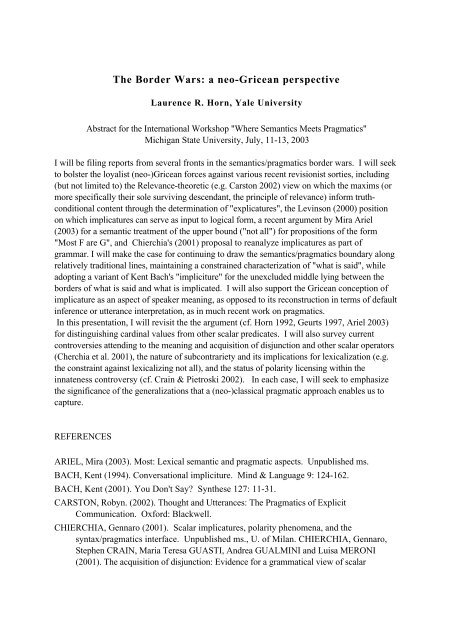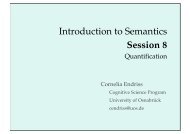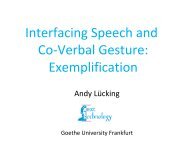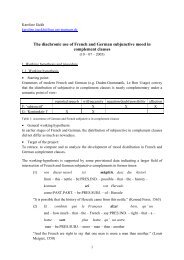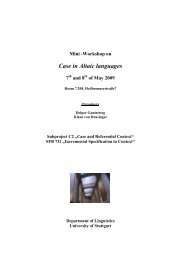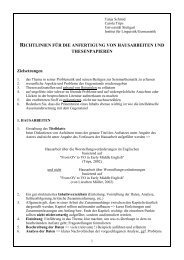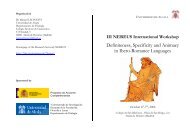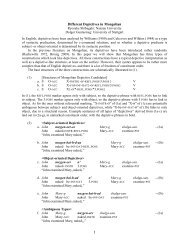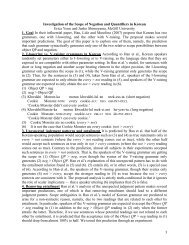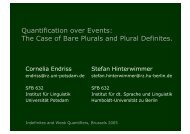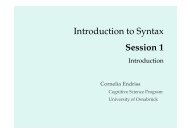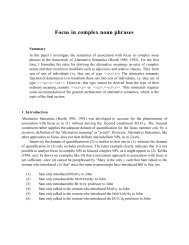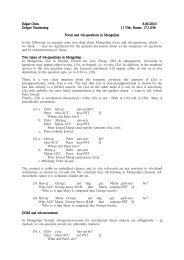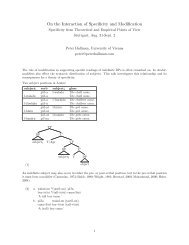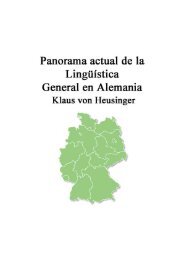SemPrag03.Progr.pdf - Institut für Linguistik/Germanistik - Universität ...
SemPrag03.Progr.pdf - Institut für Linguistik/Germanistik - Universität ...
SemPrag03.Progr.pdf - Institut für Linguistik/Germanistik - Universität ...
You also want an ePaper? Increase the reach of your titles
YUMPU automatically turns print PDFs into web optimized ePapers that Google loves.
The Border Wars: a neo-Gricean perspective<br />
Laurence R. Horn, Yale University<br />
Abstract for the International Workshop "Where Semantics Meets Pragmatics"<br />
Michigan State University, July, 11-13, 2003<br />
I will be filing reports from several fronts in the semantics/pragmatics border wars. I will seek<br />
to bolster the loyalist (neo-)Gricean forces against various recent revisionist sorties, including<br />
(but not limited to) the Relevance-theoretic (e.g. Carston 2002) view on which the maxims (or<br />
more specifically their sole surviving descendant, the principle of relevance) inform truthconditional<br />
content through the determination of "explicatures", the Levinson (2000) position<br />
on which implicatures can serve as input to logical form, a recent argument by Mira Ariel<br />
(2003) for a semantic treatment of the upper bound ("not all") for propositions of the form<br />
"Most F are G", and Chierchia's (2001) proposal to reanalyze implicatures as part of<br />
grammar. I will make the case for continuing to draw the semantics/pragmatics boundary along<br />
relatively traditional lines, maintaining a constrained characterization of "what is said", while<br />
adopting a variant of Kent Bach's "impliciture" for the unexcluded middle lying between the<br />
borders of what is said and what is implicated. I will also support the Gricean conception of<br />
implicature as an aspect of speaker meaning, as opposed to its reconstruction in terms of default<br />
inference or utterance interpretation, as in much recent work on pragmatics.<br />
In this presentation, I will revisit the the argument (cf. Horn 1992, Geurts 1997, Ariel 2003)<br />
for distinguishing cardinal values from other scalar predicates. I will also survey current<br />
controversies attending to the meaning and acquisition of disjunction and other scalar operators<br />
(Cherchia et al. 2001), the nature of subcontrariety and its implications for lexicalization (e.g.<br />
the constraint against lexicalizing not all), and the status of polarity licensing within the<br />
innateness controversy (cf. Crain & Pietroski 2002). In each case, I will seek to emphasize<br />
the significance of the generalizations that a (neo-)classical pragmatic approach enables us to<br />
capture.<br />
REFERENCES<br />
ARIEL, Mira (2003). Most: Lexical semantic and pragmatic aspects. Unpublished ms.<br />
BACH, Kent (1994). Conversational impliciture. Mind & Language 9: 124-162.<br />
BACH, Kent (2001). You Don't Say? Synthese 127: 11-31.<br />
CARSTON, Robyn. (2002). Thought and Utterances: The Pragmatics of Explicit<br />
Communication. Oxford: Blackwell.<br />
CHIERCHIA, Gennaro (2001). Scalar implicatures, polarity phenomena, and the<br />
syntax/pragmatics interface. Unpublished ms., U. of Milan. CHIERCHIA, Gennaro,<br />
Stephen CRAIN, Maria Teresa GUASTI, Andrea GUALMINI and Luisa MERONI<br />
(2001). The acquisition of disjunction: Evidence for a grammatical view of scalar


